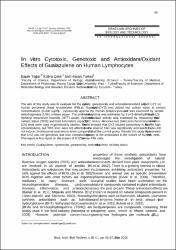In vitro cytotoxic, genotoxic and antioxidant/oxidant effects of guaiazulene on human lymphocytes
Künye
Togar, B., Celik, K., Turkez, H. (2015). In vitro cytotoxic, genotoxic and antioxidant/oxidant effects of guaiazulene on human lymphocytes. Brazilian Archives of Biology and Technology, 58(1), 61-67. https://doi.org/10.1590/S1516-8913201502880Özet
The aim of this study was to evaluate for the cytotoxicity, genotoxicity and antioxidant/oxidant activity of GYZ on human peripheral blood lymphocytes (PBLs). Guaiazulene (GYZ) was added into culture tubes at various concentrations (0-400 mu g/mL(-1)). Cytotoxicity against the human lymphocytes cultures was examined by lactate dehydrogenase (LDH) release assay. the proliferative response was estimated by 3-(4,5-dimethylthiazol-2-yl)-2,5-diphenyl tetrazolium bromide (MTT) assay. Antioxidant/oxidant activity was evaluated by measuring the total oxidant status (TOS) and total antioxidant capacity (TAC) levels. Micronucleus (MN) and chromosomal aberration (CA) tests were used in genotoxicity studies. the results showed that GYZ caused cytotoxicity in the PBLs at high concentrations, but TOS level were not affected, while the level of TAC was significantly increased. GYZ also did not induce chromosomal aberrations when compared to that of the control group. Results this study clearly revealed that GYZ was not genotoxic and also increased the capacity of the antioxidant in the culture of human PBL cells. This report is first report on the impact of GYZ on human PBL cells.


















